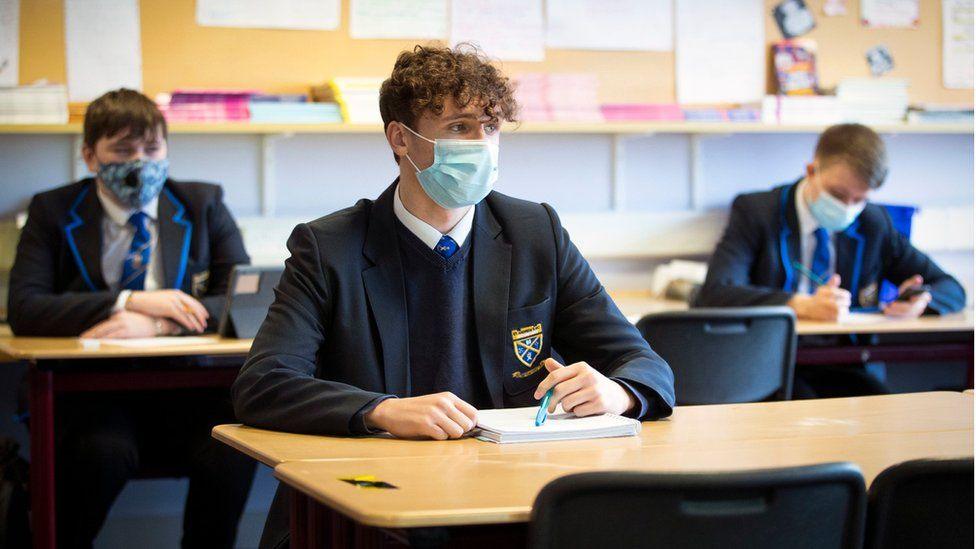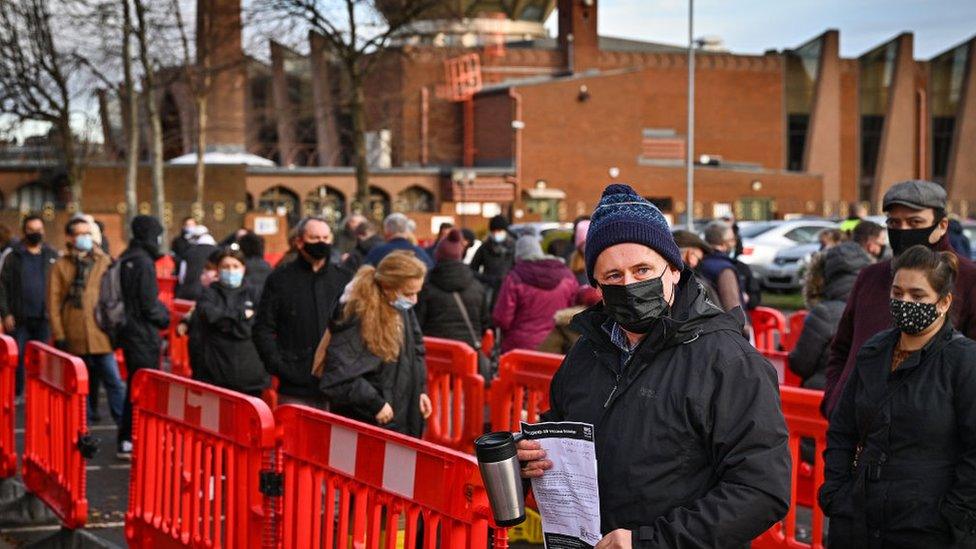Covid in Scotland: Schools will not close early due to Omicron - Sturgeon
- Published

Covid restrictions including mask-wearing are still in place in Scottish secondary schools
Scottish ministers will discuss new Covid-19 restrictions on Tuesday but will not consider closing schools early, Nicola Sturgeon has said.
The first minister said action needed to be taken to slow the spread of the new Omicron variant while the booster vaccination programme is accelerated.
But she rejected calls from a teaching union to close schools, saying the priority was to keep them open safely.
Ms Sturgeon will update MSPs on the latest data and plans on Tuesday.
She is also expected to make a televised address later in the evening, following on from Prime Minister Boris Johnson's declaration of an "Omicron emergency" on Sunday.
A total of 186 cases of the Omicron variant have been confirmed across Scotland so far, although this is thought to be a significant under-estimate of the true picture.
The UK's first death linked to the new variant was reported on Monday, and Ms Sturgeon said it was "inevitable" that more would follow in Scotland.
The first minister said Omicron was "going much faster than anything we have encountered before", with case numbers doubling every two to three days, and said it was a "near certainty" that it would be the dominant strain of the virus within the week.
An evidence paper published by the government on Friday, external suggested that in a worst-case scenario, there could be up to 25,000 new infections daily by 20 December.
Ms Sturgeon said it was not yet known whether Omicron would cause more severe illness than the previously dominant Delta variant, but she said that "even if it is milder, the sheer weight of numbers presents a challenge" to health services.

Queues formed outside a Glasgow vaccine centre on Monday as the booster programme was accelerated
On Monday morning, Health Secretary Humza Yousaf said it was "inevitable" that further restrictions would be needed, and Ms Sturgeon appeared to confirm this - while stressing that decisions are yet to be confirmed.
She said: "In my judgement, as well as speeding up the booster vaccination programme we need to slow down the virus while we do that.
"This has been going on for almost two years, people are thoroughly exhausted with it and they want to get on with their lives, so we will think carefully about anything that we are going to ask people to do.
"We will be proportionate, we will be as targeted as possible and we will be seeking to minimise the further impact on people's lives."
Travel restrictions have been already been tightened up along with self-isolation rules for close contacts of Omicron cases, and people have been advised to "defer" work Christmas parties.
While ministers have refused to be drawn on what could result from Tuesday's meeting of cabinet, the government has previously considered extending vaccine certification to more hospitality and leisure venues, and a teaching union has called for the school term to end early.


Nicola Sturgeon has made clear she wants to slow down the spread of omicron while speeding up booster jags to renew covid protection.
One of the most effective ways to break transmission is to reduce social contact, with Ireland already having re-introduced rules on meeting up indoors, external.
It would not surprise me if the Scottish government suggested a limit to the number of people and/or the number of households we mix with each day.
This would probably include some flexibility around the celebration of Christmas.
There may also be a request to shops and places of worship to improve social distancing and other safety measures.
I am using words like "suggest" and "request" because we are not necessarily looking at legally-enforceable rules.
Instead, ministers may choose to extend the advice they have already issued to take regular tests, work from home where possible and put off work Christmas parties.

The EIS said it wanted to see schools close on Friday to avoid pupils and staff being exposed to the new variant before mixing during the Christmas holidays.
However, Ms Sturgeon said school closures would not be on the table when ministers meet on Tuesday.
She said: "Any leader that stands and says 100% that anything can be ruled out forever is not being straight with you, but we are not considering the closure of schools.
"Children have suffered disproportionately in this. The priority is to keep schools open and keep them open safely - I am not considering at this stage closing schools early or not reopening schools."
Nicola Sturgeon: "Omicron is going to very quickly overtake Delta as the dominant Covid strain in Scotland"
Ms Sturgeon also said health teams would "bust a gut" to get booster jabs to all adults as quickly as possible.
Efforts have been stepped up across the UK to deliver booster vaccinations, with Ms Sturgeon saying they were "our best defence against this".
A goal has been set of offering an appointment to all adults by the end of the month, with those aged over 30 now able to make a booking.
The first minister said officials were "looking at all the possible options to build capacity" in the system, including bringing in extra staff, increasing the number of appointments at existing facilities, and opening up more vaccination centres.
The Scottish Conservatives have called for mass vaccination clinics to be re-opened, with leader Douglas Ross urging ministers to "pull out all the stops".
He said: "The rapid rollout of mass vaccine centres and more drop-in clinics is now a necessity. It is mission critical that the booster jag programme accelerates to win the race between the vaccine and the virus."
Scottish Labour meanwhile has called for more support for the hospitality industry after the advice to cancel Christmas parties, with deputy leader Jackie Baillie saying firms were "being left high and dry".
Ms Sturgeon said devolved governments were in a "difficult position" when it came to offering financial assistance or compensation to firms, with the UK government having stopped short of funding new business relief programmes.
A Treasury spokesperson said it would "continue to work effectively with the Scottish Government to protect the NHS, and support businesses and jobs across the country".

